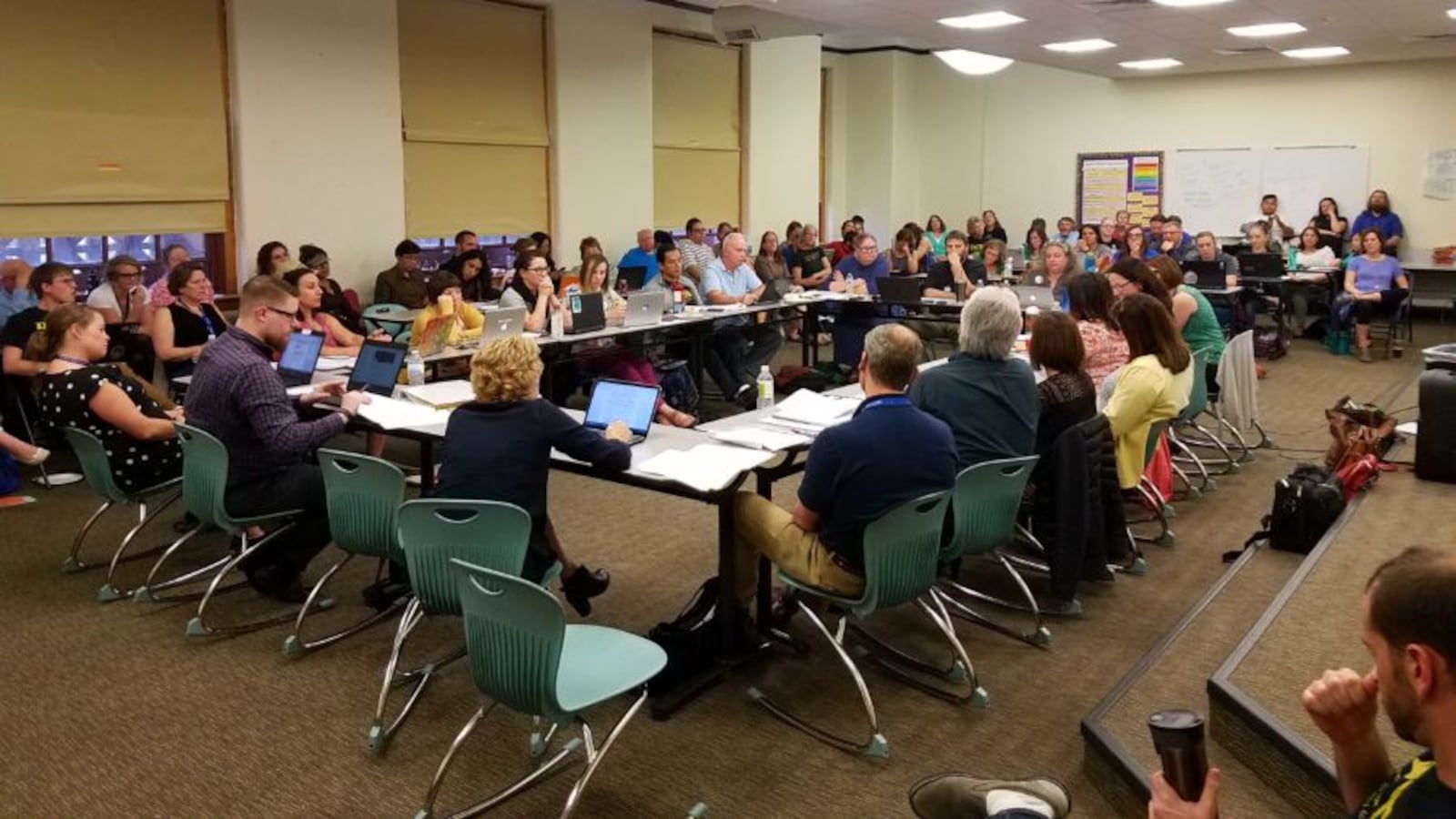The Denver teachers union and Denver Public Schools reached an agreement early Friday morning on a new five-year contract. It comes after months of in-public negotiations that saw the union take a more aggressive stance, packing bargaining sessions with teachers and community members advocating for its bullish list of demands.
The deal, reached at the end of a marathon bargaining session as the existing contract ticked toward expiration, provides the union more than the district originally proposed on teacher pay and other issues, but falls short of the union’s most ambitious goals.
However, Denver Classroom Teachers Association executive director Pam Shamburg said the educators’ show of force sent a message to the district that “our teachers have voice.”
“At some point, they started bringing the signs that said, ‘You are bargaining with me,’” Shamburg said.
The new contract includes:
- A $1,400 increase to teachers’ base salary for 2017-18, which is more than $800 higher than the school district originally offered. Before that raise, the base salary for a first-year teacher with a bachelor’s degree this year started at $41,389, though teachers could earn more through Denver’s pay-for-performance compensation system, known as ProComp. The union had asked for a $50,000 starting salary.
- An additional $1,500 per year for teachers who teach in Title I schools, or schools where a high percentage of students qualify for free or reduced price lunch, a proxy for poverty.
- Beginning next year, an increased benefits subsidy of $1,200 per year for teachers who enroll in medical plans that include coverage for their children.
- Also beginning next year, an additional day for planning lessons — and an agreement that the first and last 10 minutes of each school day will not be counted as planning time.
- A new joint task force “to review current and best practices, policies and recommendations for future improvements around the whole child,” according to a district statement.The union had proposed lowering class sizes, guaranteeing all students 45 minutes of recess or physical activity each day, and providing students daily access to fresh fruits and vegetables.
- A joint collaborative committee “to review and oversee ongoing improvements to the growth and performance system for teachers,” which is known as LEAP. Teachers have complained that the system is too subjective. Under ProComp, teachers’ evaluations impact their pay.
A joint statement from DPS and the union described the new teacher pay package as “generous.” In an interview Friday, Superintendent Tom Boasberg described it as the strongest package the district has offered in more than a decade. It strikes a good balance, he said, between increasing the salaries of all teachers and giving bigger raises to teachers in high-poverty schools, which can struggle to keep staff.
“The (financial) incentive in and of itself doesn’t change behavior,” Boasberg said. “But when coupled with really good school leaders, positive school culture and a strong set of supports — social and emotional supports for students — all of those together help attract and retain great teachers at our higher poverty schools.”
Shamburg said that while the contract is a good deal, “it is so far from enough.”
“It is ridiculous as a society what we’re asking our teachers to do for nothing, for a pittance of pay, for the hours they put in,” she said. Shamburg said the district and the union have agreed to lobby lawmakers for more state education funding, a perennial issue in Colorado.
The union’s initial demands also included a moratorium on charter school expansion and more transparency in school closure decisions, which was a contentious issue in DPS last year. From the beginning, union leaders said those demands were meant to start a conversation.
“Did we get them in the contract? No,” Shamburg said. “But did we make it clear where our teachers stand? … I think we made it clear.”
“When you go out aggressively, you don’t always get it on the first try,” she added. “But man, did we shake things up. And it is not over.”
Boasberg said that while in-public bargaining is more transparent and accessible, it also has its challenges.
“Public bargaining makes it much harder for both sides to be vulnerable and engaged in the give-and-take and exploration of solutions, as opposed to statement and restatement of positions,” he said.
“In the end,” he added, “both sides worked very, very hard to try and search for solutions.”
The previous teacher contract expired at midnight Thursday. The two sides hammered out the new deal Friday in front of an audience of more than 300 teachers and community members, a handful of whom stayed until it was signed at 4:30 a.m., Shamburg said. The new contract must be approved by union members and the Denver school board before it takes effect.

